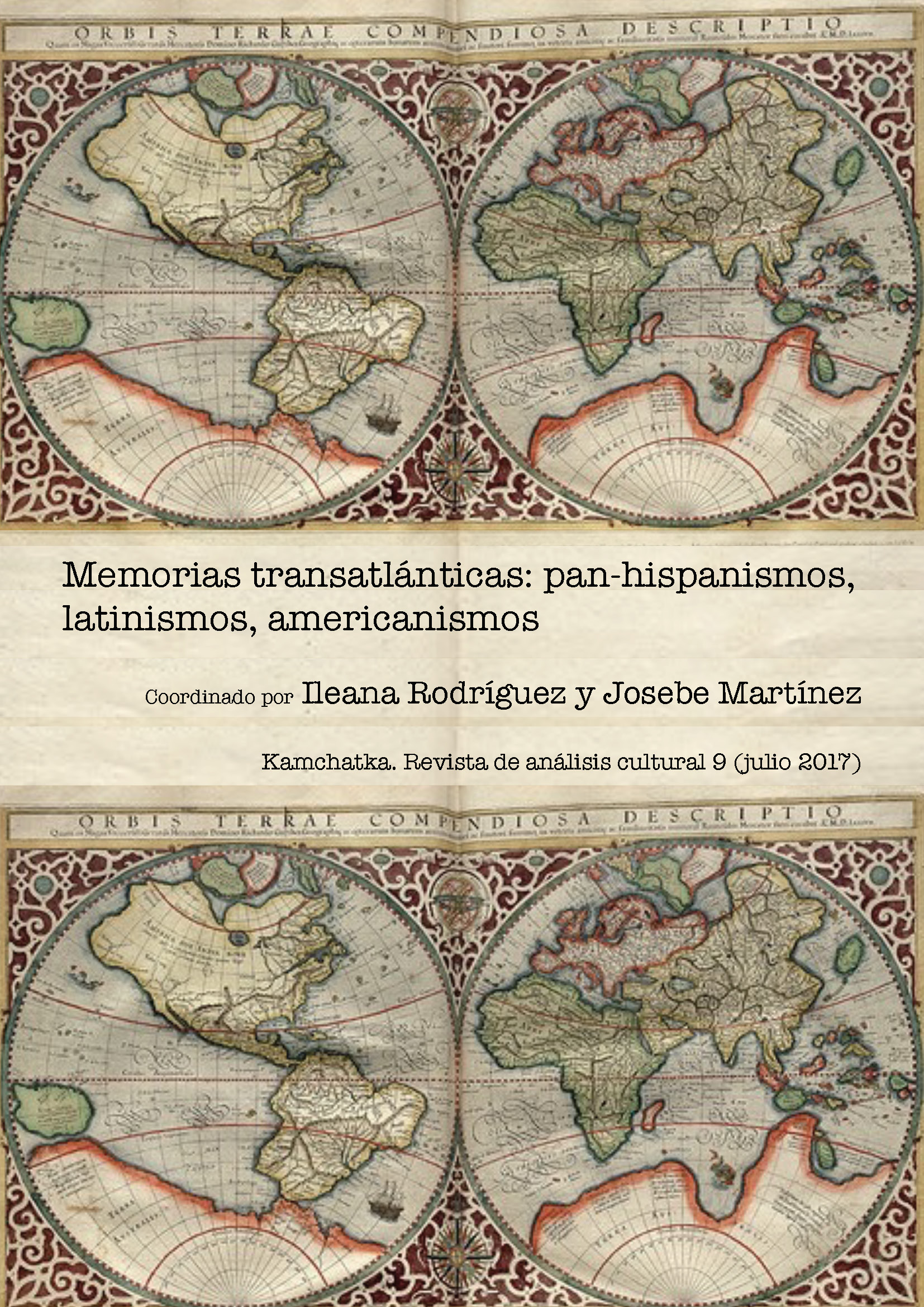¿Habrá moros en la costa? La producción cultural centroamericana leída desde España / Would there be Moors on the Coast? Central American Cultural Production as Read from Spain
DOI:
https://doi.org/10.7203/KAM.9.9548Keywords:
Literatura, Modernismo, Darío, Hispanoamérica, istmo, cosmopolitismo, Centro-americanidad, marginalidad. Abstract
Abstract
Resumen: La literatura centroamericana hizo su aparición en la península española cuando Rubén Darío viajo hacia Madrid en 1892. París y Madrid se convirtieron en las metrópolis culturales de Centroamérica a partir de esa fecha. Sin embargo, su pertenencia a la región no fue reconocida como tal. En España esta producción fue leída desde una perspectiva hispano-céntrica que le fue útil a la península para resolver sus propias contradicciones de legitimación en el seno de Europa. En consecuencia, los escritores centroamericanos que publican con éxito en la península no pueden ser centroamericanos y cosmopolitas a la vez. En España se transforman en “hispanoamericanos.” Lo anterior elide su centro-americanidad, impidiendo la validación de sus pertenencias afectivas regionales o nacionales a un espacio específico.
Palabras clave: Literatura, Modernismo, Darío, Hispanoamérica, istmo, cosmopolitismo, Centro-americanidad, marginalidad.
Abstract: Central American literature first appeared in the Spanish peninsula when Rubén Darío traveled to Madrid in 1892. Paris and Madrid became since then the Central American cultural metropoles. However, their belongingness to the region was not recognized as such. In Spain, this production was read from a Hispano-centric perspective that was useful for the peninsula to solve its own issues of legitimization within Europe. As a result, Central American writers that publish successfully in Spain cannot be Central American and Cosmopolitan at the same time. In Spain, they become “Hispanic Americans”. This elides their Central Americanness, preventing the validation of their regional or national affective belonging to a specific space.
Keywords: Literature, Modernism, Darío, Hispanic America, isthmus, Cosmopolitism, Central Americanity, marginality.
 Downloads
Downloads
 References
References
Anderson, Perry (1998). The Origins of Postmodernity. London: Verso.
Arellano, Jorge Eduardo. “Darío y sus Cantos de vida y esperanza.” Anales de Literatura Hispanoamericana, 35 (2006): 123-152.
Arias, Arturo (2007). Taking Their Word: Literature and the Signs of Central America. Minneapolis: U of Minnesota Press.
Avelar, Idelber (1999). The Untimely Present: Postdictatorial Latin American Fiction and the Task of Mourning. Durham: Duke U P.
Barthes, Roland (1975). S/Z. New York: Hill and Wang.
Belli, Gioconda (1988). La mujer habitada. Managua: Editorial Vanguardia.
Belli, Gioconda (2005). El pergamino de la seducción. Barcelona: Seix Barral.
Belli, Gioconda (2008). El infinito en la palma de la mano. Barcelona: Seix Barral.
Beverley, John (1999). Subalternity and Representation: Arguments in Cultural Theory. Durham: Duke U P.
Bosteels, Bruno. “Untiming Decadence in Latin America.” PMLA 124/1 (enero 2009): 277-279.
Darío, Rubén (1976). Autobiografía. Prólogo de E. Anderson Imbert. Argentina: Ediciones Marymar.
Darío, Rubén (1977). “La ‘Sarmiento’ en España.” Escritos dispersos de Rubén Darío, vol. 2. La Plata: U Nacional.
Darío, Rubén (2000). Historia de mis libros. Nicaragua: Ediciones Distribuidora Cultural.
De Castro, Juan E. “Rubén Darío visits Ricardo Palma: Tradition, Cosmopolitanism, and the Development of an Independent Latin American Literature.” Chasqui 36.1 (mayo 2007): 48-61.
Dussel, Enrique (1998). Ética de la liberación en la edad de la globalización y de la exclusión. Madrid: Trotta.
Foucault, Michel (1977). “What is an Author?” Language, Copunter-memory, Practice, ed. Donald F. Bouchard. Ithaca: Cornell U P,:113-138.
Franco, Jean (2002). The Decline & Fall of the Lettered City. Cambridge: Harvard U P.
Halfon, Eduardo (2003). Esto no es una pipa, Saturno. Guatemala: Alfaguara.
Martínez Gómez, Juana (ed. e introd.). “En el centenario de Cantos de Vida y Esperanza.” Anales de Literatura Hispanoamericana, 35 (2006): 9-152.
Medina, Julia. “Vestíbulos del hombre público: Prólogos ‘desconocidos’ de Rubén Darío.” A contracorriente. 3/2 (invierno 2005): 127-155.
Mignolo, Walter (2000). Local Histories/Global Designs: Coloniality, Subaltern Knowledges, and Border Thinking. Princeton: Princeton U P.
Morán, Francisco. “‘Con Hugo fuerte y con Verlaine ambiguo’: ¿El reino interior o los peligrosos itinerarios del deseo en Rubén Darío?”. Iberoamericana LXXII/215-216 (abril-septiembre 2006): 481-495.
Moreiras, Alberto (1996). “The aura of Testimonio.” The Real Thing: Testimonial Discourse in Latin America, ed.Georg M. Gugelberger. Durham: Duke U P.
Osborne Peter y Lynne Segal. “Gender as performance: An interview with Judith Butler.” Radical Philosophy 67 (1993): 32-39.
Quijano, Aníbal. “Colonialidad del Poder y clasificación social.” Journal of World Systems Research. XI/ 2, (verano/otoño 2000): 342-386.
Rama, Angel (1970). Rubén Darío y el modernismo: circunstancias socioeconómicas. Caracas: U de Venezuela.
Ramírez, Sergio (1977). ¿Te dio miedo la sangre? Caracas: Monte Avila.
Ramírez, Sergio (1998). Margarita, Está Linda la Mar. Madrid: Algafuara.
Ramírez, Sergio (2002). Sombras nada más. México: Alfaguara.
Ramírez, Sergio (2004). Mil y una muertes. México: Alfaguara.
Robbins, Jill. “Globalization, Publishing, and the Marketing of ‘Hispanic’ Identities.” Revista Iberoamericana, III/9 (2003): 89-101.
Robinson, William I. (2003). Transnational Conflicts: Central America, Social Change, and Globalization. London: Verso.
Rodríguez, Ileana (2004). Transatlantic Topographies: Islands, Highlands, Jungles. Minneapolis: U of Minnesota P..
Rodríguez Padrón, Jorge. “Sobre la lectura de Cantos de vida y esperanza y otras cosas.” Anales de Literatura Hispanoamericana 35 (2006): 55-68.
Serrano Caldera, Alejandro. “Rubén Darío: renovador de la palabra y la cultura.” La Prensa digital. (7/04/2009).
Trigo, Abril (2008). Memorias migrantes: Testimonios y ensayos sobre la diáspora uruguaya. Rosario/Montevideo: Beatriz Viterbo.
Zanetti, Susana. “La pérdida del reino y los Cantos de vida y esperanza.” Anales de Literatura Hispanoamericana 35 (2006): 21-30.
Downloads
Published
How to Cite
-
Abstract732
-
Artículo (Español)438
Issue
Section
License
This journal provides an immediate free access to the content on the principle that freely make investigation available to the public, which promotes an increased global knowledge exchange.
Unless otherwise indicated, texts published in this journal are under the license Attribution-NonComercial 4.0 by Creative Commons. These texts may be copied, distributed and publicly communicated whenever the publication’s author and title are quoted and whenever they are not used for commercial purposes. In any case, intellectual property of the articles and its potential economic rights entirely belong to its authors.
The full license can be consulted on https://creativecommons.org/licenses/by-nc/4.0/. We encourage authors to disseminate papers published in Kamchatka. Journal of cultural analysis electronically, in institutional digital repository or in their websites.





